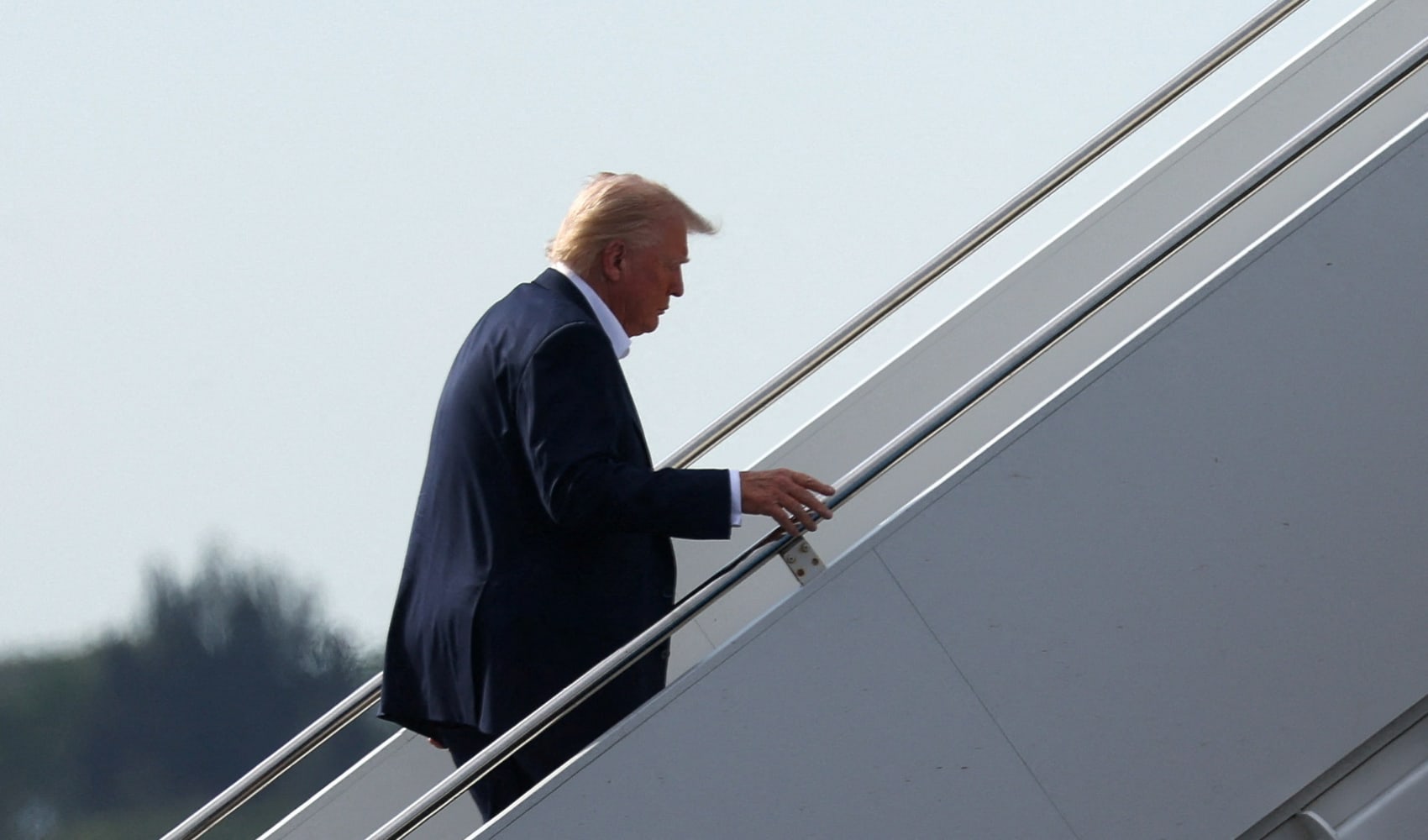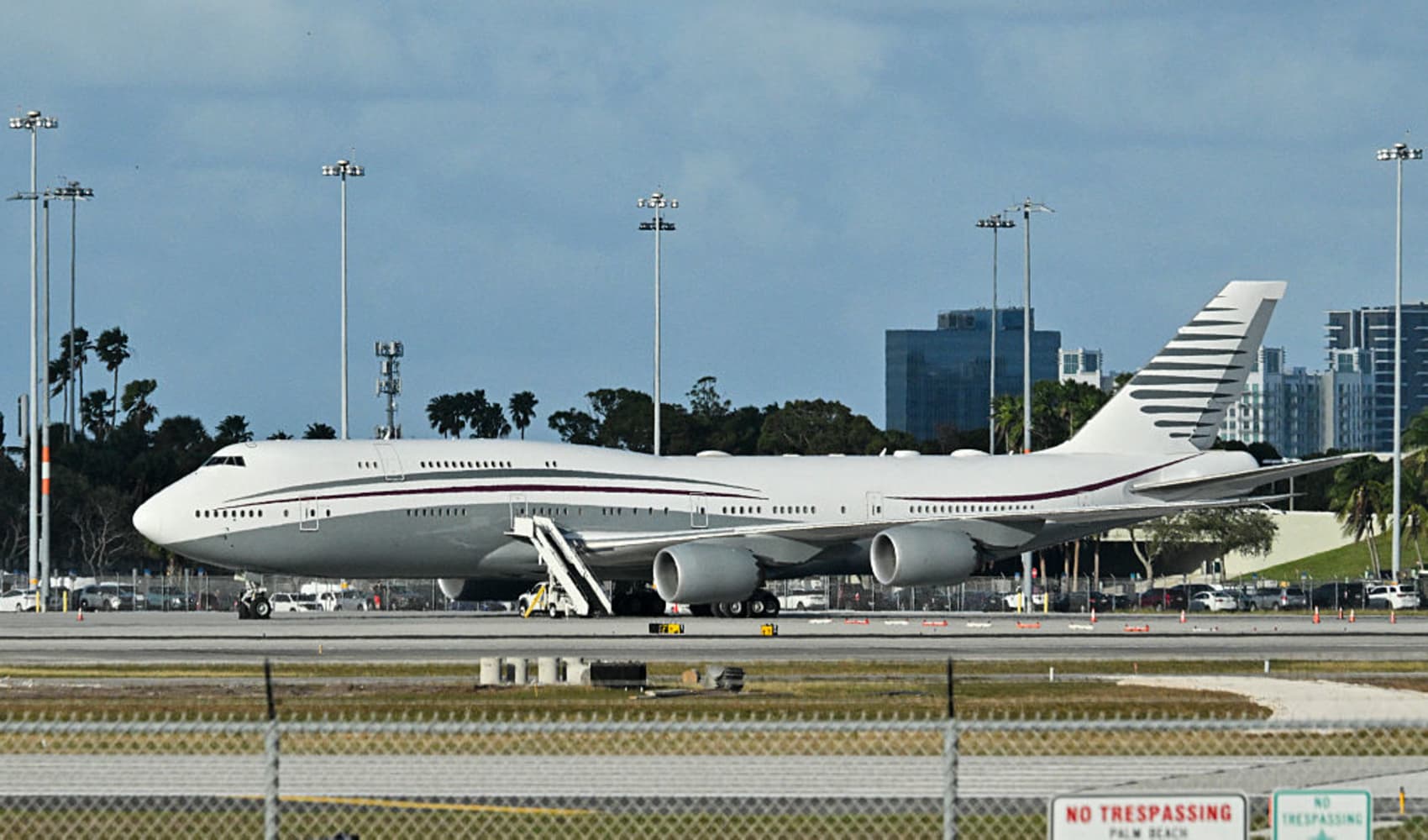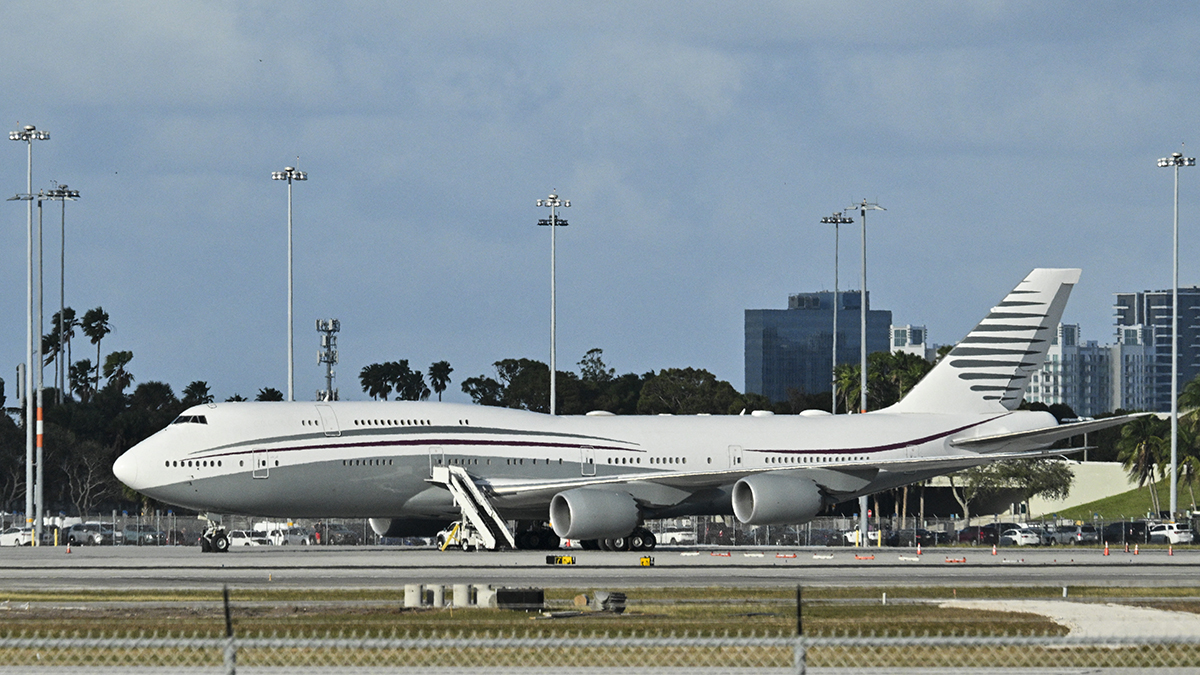Trump's Qatar Jet: Air Force One Gift Sparks Legal Firestorm!
Trump's Qatar Air Force One? Luxury Jet Gift Sparks Controversy!
Introduction: A Gift Fit for a (Former) President?
Hold on to your hats, folks! The political skies are buzzing with a story that's sure to raise eyebrows. Imagine receiving a gift so grand, so opulent, it makes your jaw drop. Well, according to multiple sources, that's precisely what's happening with former President Donald Trump. He's reportedly poised to accept a luxurious Boeing 747-8 jet from the royal family of Qatar, a gift that could potentially become his very own "Air Force One." But is this a simple act of generosity, or is there more than meets the eye? Let's dive in!
The Qatar Connection: Royal Generosity or Political Maneuvering?
So, why Qatar? What's the story behind this incredibly generous offer? The royal family of Qatar has a long history of close relationships with global leaders. But giving away a Boeing 747-8 – a plane typically reserved for heads of state – is an entirely different ballgame. Is it a gesture of goodwill, a thank you for past services, or perhaps a strategic move to maintain influence? These are the questions swirling around this fascinating development.
Qatar's Geopolitical Role
Qatar plays a significant role in global energy markets and has strong ties to the United States. Understanding their geopolitical position helps to put this gift in context. Are they trying to solidify a relationship with Trump even after his presidency?
The Boeing 747-8: A Flying Palace
We're not talking about just any plane here. The Boeing 747-8 is a behemoth of the skies, a symbol of power and luxury. Often used as the VIP transport for world leaders, it can be configured to include private suites, conference rooms, and even dining areas. Think of it as a flying penthouse, ready to whisk its occupants away in unparalleled comfort and style. This isn't your average private jet, folks; this is a statement.
Customization and Opulence
Imagine the possibilities! Trump could customize this jet to his exacting specifications. Gold-plated faucets? Marble bathrooms? The sky's the limit (pun intended!). It's a canvas for showcasing his personal brand.
Air Force One... Sort Of: What Does It Really Mean?
While news outlets have used the term "Air Force One" to describe the potential jet, it's important to clarify. "Air Force One" is technically the call sign for any U.S. Air Force aircraft carrying the President. This jet, being gifted to Trump's presidential library foundation, would not technically be "Air Force One." However, the implication is clear: it's a plane fit for a president, even a former one.
The Power of Symbolism
Regardless of the official designation, the optics are undeniable. A former president flying around in a luxurious Boeing 747-8 will certainly evoke images of presidential power and prestige.
The Presidential Library Foundation: A Landing Pad for Luxury
The plane is reportedly set to be transferred to Trump's presidential library foundation. Presidential libraries aren't just archives of documents and artifacts. They often serve as centers for policy discussions, educational programs, and, of course, fundraising. A luxury jet in the foundation's possession could be a powerful tool for attracting donors and bolstering the Trump legacy.
Fundraising Opportunities
Imagine the fundraising dinners hosted on board! It's a unique selling point for attracting high-net-worth individuals and solidifying Trump's influence in the years to come.
Legal Eagles Take Flight: Ethical Concerns and Legal Challenges
Now, here's where things get interesting. Legal scholars and experts are already raising questions about the legality and ethical implications of this gift. Could accepting such a lavish present violate ethics rules designed to prevent undue influence? The potential for legal challenges is significant.
The Emoluments Clause
The Emoluments Clause of the Constitution prohibits government officials from accepting gifts or emoluments from foreign powers without the consent of Congress. While Trump is no longer president, the transfer to his foundation could still raise concerns.
Precedent and Perception
What kind of precedent does this set? Is it appropriate for former presidents to accept such extravagant gifts from foreign governments? The optics are undoubtedly controversial.
The Court of Public Opinion: Will It Fly With the American People?
Regardless of the legal outcome, the court of public opinion will have its say. Will Americans see this as a generous gift, or as a sign of potential corruption or undue influence? The answer will likely depend on political affiliation and pre-existing opinions of the former president.
Social Media Storm
Prepare for a social media firestorm! This story is ripe for memes, hot takes, and heated debates across all platforms.
Trump's Aviation History: From Trump Force One to Qatar's Gift
Trump isn't exactly a stranger to luxury aviation. Before entering politics, he owned his own Boeing 757, famously dubbed "Trump Force One," which was a symbol of his wealth and brand. This history adds another layer to the narrative, suggesting a continued appreciation for private jet travel and the status it conveys.
The Power of Branding
For Trump, aviation has always been about branding. The Qatar jet provides another opportunity to showcase his personal style and project an image of success.
The Future of Air Travel: Luxury Jets as Political Tools
Does this gift signal a new trend of luxury jets being used as political tools? Could we see other former world leaders receiving similar gifts in the future? The implications for international relations and ethical standards are worth considering.
A New Era of Influence
Perhaps we're entering an era where luxury assets become bargaining chips in international relations, blurring the lines between diplomacy and personal enrichment.
Alternative Perspectives: Defending the Gift
Of course, not everyone sees this as a cause for concern. Some might argue that it's simply a generous gift from a friendly nation, with no strings attached. They might point to Qatar's close ties to the United States and argue that the gift is a sign of continued cooperation.
A Sign of Friendship?
Could it be simply a demonstration of friendship and respect from the Qatari royal family to a former world leader?
The Role of the Media: Scrutiny and Speculation
The media will play a crucial role in shaping the narrative surrounding this gift. Expect intense scrutiny of the legal and ethical implications, as well as speculation about Qatar's motivations. How the story is framed will undoubtedly influence public opinion.
Fact-Checking and Responsible Reporting
In an era of misinformation, it's crucial for the media to focus on fact-checking and responsible reporting, avoiding sensationalism and focusing on the verifiable facts.
Potential Outcomes: What Happens Next?
So, what happens next? Will Trump accept the gift? Will legal challenges emerge? Will the public outcry force a change of plans? Only time will tell. But one thing is certain: this story will continue to generate headlines and spark debate for weeks, if not months, to come.
The Long Game
This isn't just a short-term news cycle. The legal and ethical ramifications of this gift could have long-lasting consequences for Trump's legacy and the standards of conduct for former presidents.
The Impact on U.S.-Qatar Relations: A Delicate Balance
This situation could potentially strain U.S.-Qatar relations, depending on how it unfolds. The United States relies on Qatar for various strategic partnerships, so any controversy surrounding this gift could create diplomatic challenges.
Navigating the Diplomatic Minefield
Both the U.S. and Qatari governments will need to carefully navigate this situation to avoid any lasting damage to their relationship.
Conclusion: A Gift with Strings Attached?
The potential acceptance of a luxury jet from Qatar's royal family by former President Trump is a story brimming with intrigue. It raises questions about ethics, legal boundaries, and the potential for foreign influence. While some may see it as a harmless act of generosity, others view it with suspicion. Ultimately, the outcome will depend on legal scrutiny, public opinion, and the choices made by those involved. One thing is certain: this saga is far from over. Is this a gift of friendship or a carefully calculated move on the geopolitical chessboard? Only time will truly tell.
Frequently Asked Questions
- What is the Emoluments Clause and how does it relate to this situation?
The Emoluments Clause of the U.S. Constitution prohibits government officials from accepting gifts or payments from foreign powers without congressional approval. While Trump is no longer in office, the application of this clause to the transfer of the jet to his foundation is being debated.
- Will this jet actually be called "Air Force One"?
No. "Air Force One" is the official call sign for a U.S. Air Force aircraft carrying the current President. This jet, if accepted, would be a private aircraft owned by Trump's presidential library foundation.
- What are the potential ethical concerns surrounding this gift?
The primary ethical concern is whether accepting such a lavish gift from a foreign government could create the appearance of undue influence or potential conflicts of interest, even after Trump's presidency.
- What could Trump potentially use the jet for?
The jet could be used for a variety of purposes, including personal travel, business trips, and fundraising events for his presidential library foundation. It would also serve as a powerful symbol of his wealth and status.
- How might this affect relations between the US and Qatar?
Depending on how the situation unfolds, it could potentially strain relations. The US relies on Qatar for strategic partnerships, and any controversy surrounding the gift could create diplomatic challenges.


